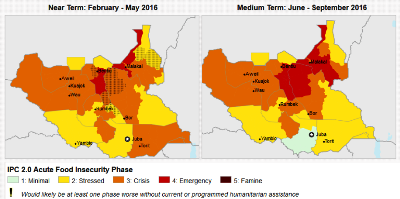UNICEF warns of ‘catastrophic’ food insecurity in S. Sudan
August 6, 2016 (JUBA) – The United Nations Children’s Fund (UNICEF) said it had started responding to the growing food security emergency causing malnutrition in children in both rural and urban areas of, a month after violence broke out in South Sudan.

This year, UNICEF has reportedly treated 120,000 children under age five for severe malnutrition, a figure higher than what the agency had in the same period last year.
“Initially, UNICEF had been planning to provide support to 166,000 children in 2016, but that figure has been revised to more than 250, 000,” the official said.
Last month, clashes between South Sudan’s rival forces in the capital, Juba displaced over 40,000 civilians, the world body said.
Seven out of the country’s 10 states have reached the malnutrition-rate-emergency threshold of 15 per cent, while in Northern Bahr el Ghazal, the malnutrition rate stands at 33 per cent, noted Boulierac.
According to agency, a sharp rise in malnutrition in urban areas, including Juba, where the rates of children admitted for malnutrition to UNICEF-supported Al-Sabbah children’s hospitals were some 20% higher in the first six months of 2016 than for the same period last year.
The official, in the statement, also cited the country’s inflation rate as one of the main reasons for the high increase, explaining that it made basic household staples too expensive for many families.
He, however, said although UNICEF could not provide the numbers of children dying from starvation, “one quarter of a million children in South Sudan are facing severe malnutrition.”
Inaccessibility of roads due to the ongoing conflict has further limited UNICEF’s ability to respond in the most urgent cases, leaving the more expensive option of air transport to deliver supplies, said Boulierac.
“Due to insecurity and the rainy season, UNICEF staffs in South Sudan are unable to be fully mobile and deliver their goods and services,” he stressed.
Meanwhile, of the $154.5 million UNICEF needs for South Sudan in 2016, the agency has reportedly received only $52 million to assist with water and sanitation, child support services, nutrition, health and education.
More than 900,000 children, Boulierac further disclosed, have been displaced in the country, which – with 1.8 million children, or 51 per cent of school-age youngsters out of school – also had the highest proportion of out-of-school children in the world.
“An estimated 16,000 children had been recruited by armed groups, and there were concerns that the renewed violence would lead to a further expansion of that practice,” he explained.
Meanwhile the office of the UN High Commissioner for Refugees (UNHCR), said a total of 917, 418 South Sudanese refugees have been displaced, mostly in Uganda.
(ST)
